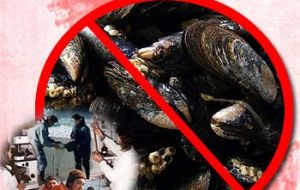MercoPress. South Atlantic News Agency
Toxic algae forces Uruguay to ban mollusk consumption
 Samples collected and analysed confirm the presence of red tide on the coasts of Rocha and Maldonado. (Photo: Dinara/FIS)
Samples collected and analysed confirm the presence of red tide on the coasts of Rocha and Maldonado. (Photo: Dinara/FIS) Uruguay's Aquatic Resources Directorate (DINARA) on Tuesday extended for another ten days the ban on extraction, trade and transport of bivalve mollusks (mussels, cockles and clams) as the red tide continues to expand along the country's Atlantic coastline.
DINARA authorities have urged the public to avoid acquiring and consuming mollusks originally from the Atlantic coast or of uncertain origin. Mollusks contaminated by the toxic red algae bloom are dangerous for human consumption with symptoms of diarrhea, vomiting, nausea and fever. For allergic patients the consequences could be even worse. Uruguayans officials however, cleared the consumption of fish, shrimp and squid, seafood unaffected by the bloom toxin. The ban was imposed following the detection of the toxin in certain seafood, which was trailed to blooming of mini-algae caused by an out of season increase in water temperatures, according to local press reports. "Laboratory tests carried out by DINARA confirmed and ratified the existence of the algae bloom along the Atlantic coast" said Fisheries president, Daniel Montiel. According to lab tests taken throughout the year and previous manifestations of the algae bloom, "it is likely the ban will be extended for another week or 10 days at the minimum" pointed out Montiel. (FIS)




Top Comments
Disclaimer & comment rulesCommenting for this story is now closed.
If you have a Facebook account, become a fan and comment on our Facebook Page!